New Delhi: It looked like any other Indian matrimonial advertisement. A biodata rattling off age, height, education, job, family background. But it had a peculiar condition: “secular registered marriage” only.
“I’m from Malappuram district, age: 35 years old, height: 177 centimetres, Masters in Social Work, MPhil….Working in a government hospital. My family consists of me and my mother. My elder brother is married (secular-registered marriage),” said the bio, written in Malayalam.
Then came the unusual part. “We abandoned all religious and caste-based customs 40 years ago. My partner can have her own beliefs, but she should be able to live with our set-up.”
This post was uploaded on a bold new Instagram page called ‘Secular Matrimony’, largely in Malayalam. Based in Kerala, it foregrounds interfaith and intercaste unions, rationality, and atheism in a country where same caste, same religion remains the central nervous system of the arranged marriage market.
“Interest is toward a secular registered marriage,” added the 35-year-old’s post. This unique clause isn’t a bug. It’s the feature.
But there’s still secrecy in this kind of matrimonial search. The ad showed a strapping young man in his mid-30s. But his name was missing. Unlike other matrimonial platforms, those interested in his profile were directed to a helpline — no comments, no private DMs. It is India 2024 after all. You can’t be too safe, say users.
“We used to share their numbers earlier, but women would get a lot of calls. Religious bigots would also send threats,” said Manu Manushyajaathi, the 35-year-old founder of Secular Matrimony. “The helpline allows us to screen for secular, nonreligious people. Almost 90 per cent of marriages from our initiative are outside caste and also religion.”
Among the platform’s early success stories is 38-year-old Afsal P, who found his partner Rashna here.
“Being from a Muslim background, I didn’t know what to expect. There were a lot of ideological clashes on Facebook,” he said. “But this page was different. I got contacted not just by potential women but also by rationalist parents across religions.”
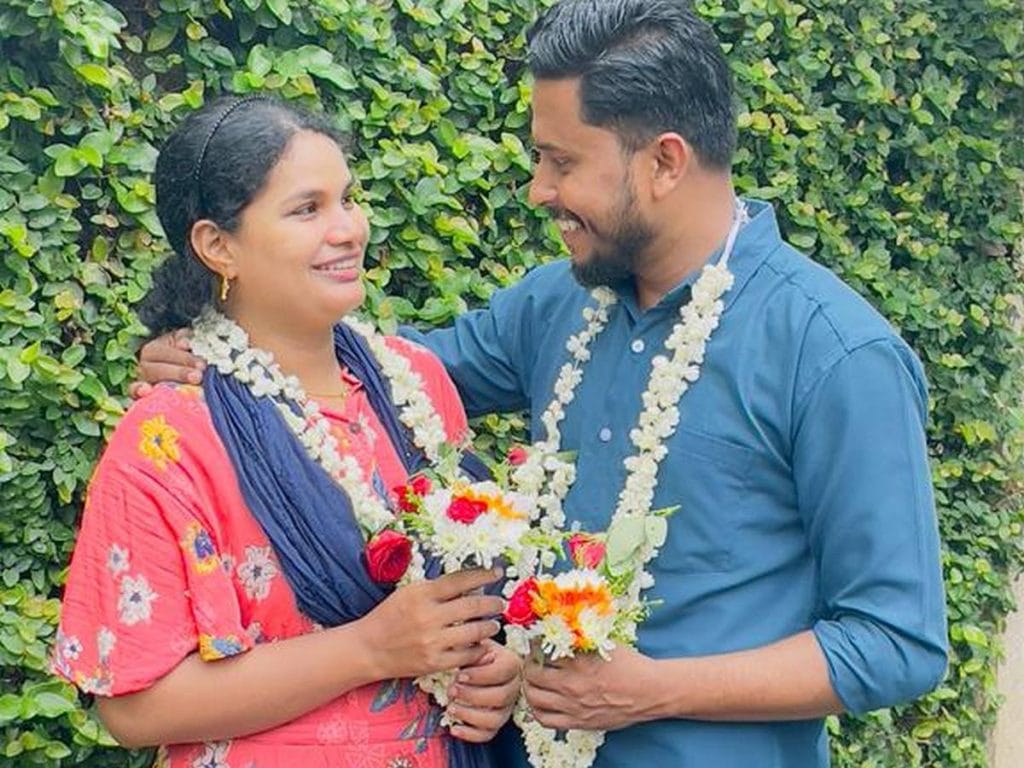
These stories are outliers in India. The 2011-12 India Human Development Survey (IHDS), for instance, found that fewer than 10 per cent of urban respondents reported anyone in their family marrying outside their caste. Interfaith marriages were even rarer—just 5 per cent said someone in their family married outside their religion.
But Secular Matrimony has quietly grown its user base, with over 57,000 followers on Instagram, 64,000 on Facebook, and a private WhatsApp group of 32,000 members from Kerala and beyond. Manu said they’ve shared profiles from Uttar Pradesh and Gujarat a couple of times, as well as a few from Karnataka and Tamil Nadu.
The ads look like something from Shaadi.com but with a twist. An engineer from Ernakulam writes that he loves pets, dislikes caste, and only wants “a good-hearted partner.” A Bengaluru-based physical design specialist calls herself an emotional “moon-gazer” but specifies her “parents are non-religious, so we also grew up secular”. A scientist from Trichy is looking for someone who shares her “progressive values—equality for all”. A Thiruvananthapuram-based badminton coach announces he’s an atheist “against religious thinking”.
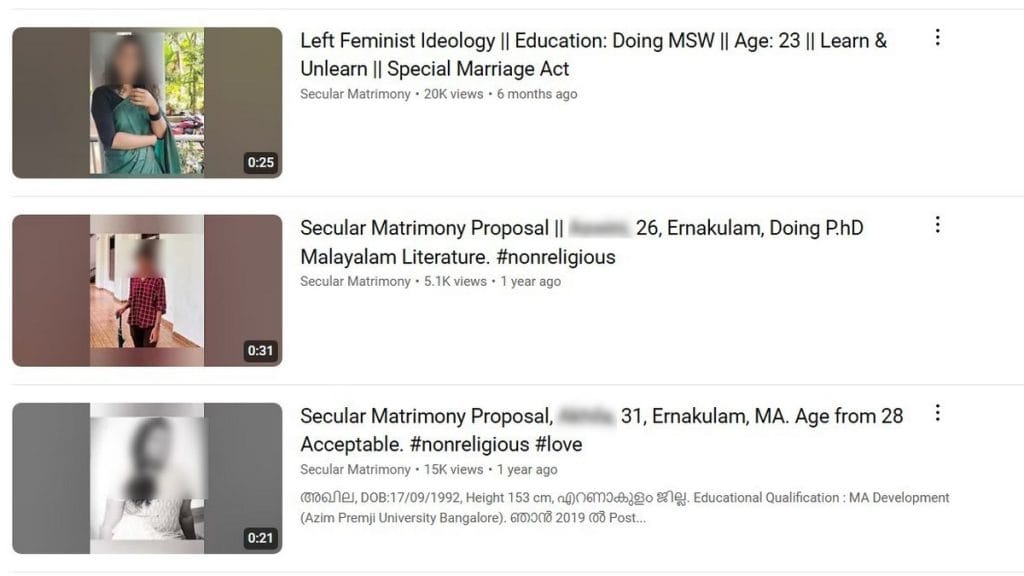
It’s part of a small crop of platforms promoting love beyond caste, religion, and tradition. One popular initiative is ‘India Love Project’, which shares stories of interfaith, intercaste, and queer couples. Several posts are about dealing with hostile families, navigating wedding registrations, and raising children in today’s polarised India. The uptake, though, isn’t always big. In Tamil Nadu, Inaiyar Matrimony tries to connect people interested in “Equality Marriages”, but it doesn’t have a substantial social media presence, with only about 640 followers on Facebook. In December 2014, the Democratic Youth Federation of India (DYFI)— the youth wing of the Communist Party of India (Marxist)—launched ‘SecularMarriage.com’. Despite a high-profile inauguration by actor-director couple Rima Kallingal and Aashiq Abu, it quietly fizzled out.
Secular Matrimony, however, started gaining steam around 2022, though it’s been around since 2014. Manu, a mathematics teacher by day, claimed “at least 100 couples” have entered a serious relationship or married through the platform—including him.
“This was started with the idea of sending a message that there is a secular alternative,” he said. “In some ways, it’s like how Indians fix arranged marriages — but for freethinkers who would criticise the institution of arranged marriage itself.”
Even atheist, rationalist, and progressive parents want a say in their children’s marriages, and they’re increasingly active on the platform. It’s like ‘arranged’ matchmaking with a subversive twist.
Also Read: Indian atheists fight community, courts, caste. Tricky balance between culture & religion
Only love, no religion
As a child, Manu Manushyajaathi couldn’t stop asking questions. By the time he reached 7th grade, those questions had turned into convictions and he embraced atheism.
“From my childhood, I was always questioning the idea of God,” he said. “Naturally, I also later wondered what religion has to do with finding love. So now we have this.”
The seeds of Secular Matrimony were sown in in May 2014 when Manu started a Facebook page called Mathamillatha Jeevithangal (Life Without Religion) to share stories of inter-caste, inter-faith, and LGBTQI + couples. At the time, he worked as an insurance development officer at LIC and spent his free time volunteering with the Kerala Shastriya Sahitya Parishad, a scientific-rationalist group.
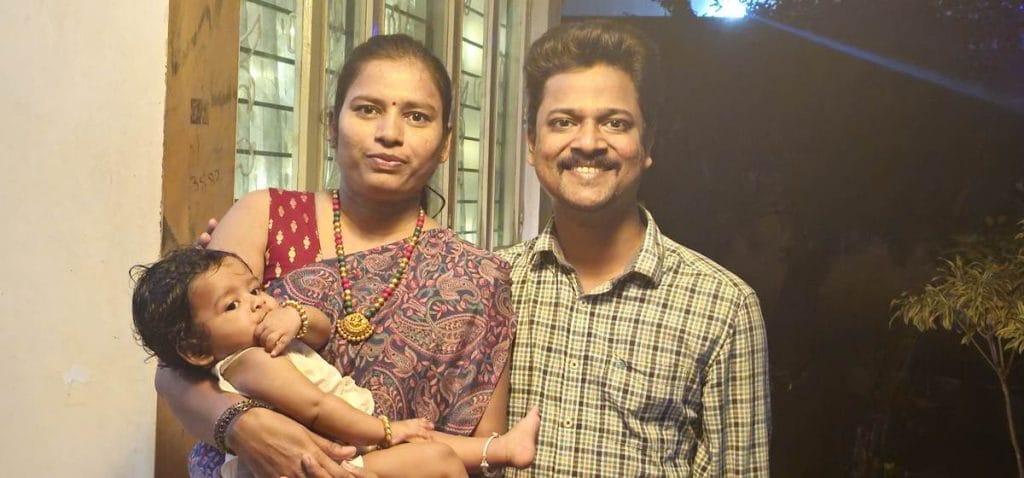
A few months later, inspired by the success of Mathamillatha Jeevithangal, he launched Secular Matrimony, which focused on classifieds for non-religious and progressive people.
“I thought, why not start a community for interreligious couples and non-religious people?” he said. And so Secular Matrimony was born in October 2014.
“Secular Matrimony is where the matchmaking or search itself happens,” said Manu. “Mathamillatha Jeevithangal shares stories not just of couples who got married through the Secular Matrimony platform but also of any inter-religious or inter-caste couple from anywhere, including posts about famous celebrity couples.”
Platforms like this are helpful to all of us to an extent—they give you a space to speak up for yourself and stand for a cause.
–UAE-based schoolteacher Kamar Niza
The Facebook page amassed over 10,000 followers in just two months. But the momentum didn’t last, and the initiative went dormant. It wasn’t until the Covid-19 pandemic that it became popular again. Today, it is a full-fledged multi-channel platform for atheists, rationalists, and progressives to find love unbounded by caste, religion, and patriarchal conventions.
It has also become a part of Manu’s personal story. In 2021, he met his partner, government teacher Shivi Leela, after she posted her profile on Secular Matrimony. They connected over shared ideals, discussing gender-egalitarian parenting while dating. After living together for a year, Shivvi proposed. He doesn’t like the word “wife” and calls her his “life partner” instead.
Manu points out that Secular Matrimony isn’t just for marriage, but also supports live-in relationships. And it’s not just caste or religion no bar. It’s open to all sexual orientations and gender identities.
The platform has also helped people with traumatic pasts. Child and women’s rights activist PE Usha recalled two cases where survivors of human trafficking found their partners through the platform.
“There was a woman who wanted to get married but wasn’t able to find anyone because of stigma. She finally met a guy through this platform and got married in 2022 under the Special Marriage Act,” said Usha about one of them. “Nobody had any problems—that’s how it should be.”
While mainstream platforms often feature users claiming to be “progressive” and “no caste or religion bar,” the reality rarely matches. Secular Matrimony, however, tends to attract people ready to live by these ideals.
Dating with a difference
In December 2014, Afsal P posted on Secular Matrimony on a whim. His profile was bare-bones: 28 years old, from Tirur, working in Abu Dhabi at a reputed company.
“I wanted someone with similar interests like a passion for films, secular views,” he told ThePrint.
Eight years later, after a long live-in relationship, he was married to Rashna and a father to a daughter, Thithi. In an update on the platform, Afsal wrote: “Finding a partner who thinks beyond the barriers of religion is a challenge we all face… Hearty salute to this group who stood by us to lead many people like us to a happy life despite many criticisms and crises.”
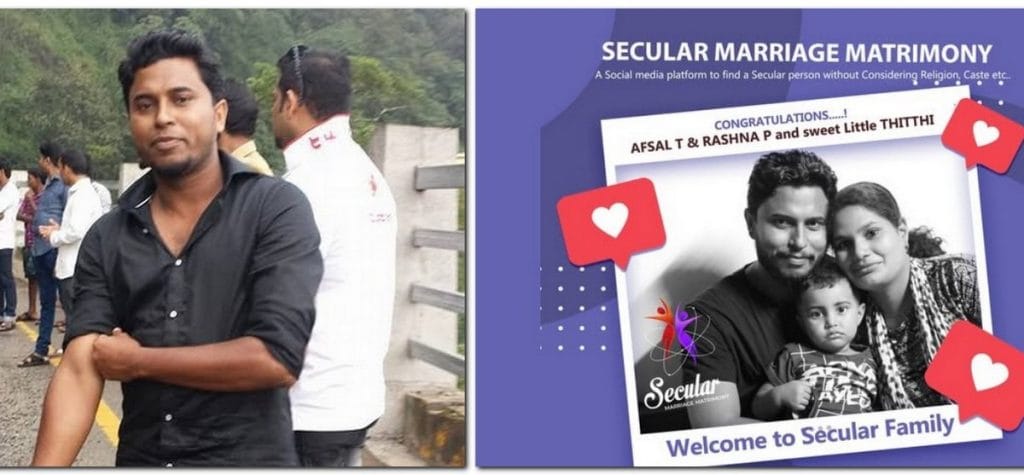
According to founder Manu, this post gave the platform a fresh burst of life. It renewed hope among those looking for secular sweethearts.
Dating and marriage in India are harder than ever. The deepening of religious divides, vigilantism, and the policing of personal lives have made finding a partner more fraught. Add to that a growing fatigue with dating apps and matrimonial websites.
For 31-year-old Ernakulam-based lawyer Sarath Chandran, apps were the first stop when he began looking for love, only to find himself disillusioned.
(Secular Matrimony) was different from the dating apps. People were serious about committing. And we discussed things like how to have a gender-egalitarian marriage, caste-neutral, gender-neutral and religion-neutral names for kids. Once we cleared those, we started to know each other as people.
–Ernakulam-based lawyer Sarath Chandran
“I was initially active on Bumble, but it was just endless swiping. Most people on such apps are looking for something temporary, not serious commitment,” he told ThePrint. “The other option was to use a matrimonial website, but they’re filled with very traditional people and their parents.”
Chandran’s dilemma isn’t unusual. While dating apps don’t filter by caste or religion, they often come with the baggage of ghosting, casual hook-ups, and ambiguity. Matrimonial sites, meanwhile, focus on tech-powered arranged marriages, complete with parental approval and checklists for caste, religion, and family status. Neither works for progressives seeking serious relationships. This gap led Chandran to Secular Matrimony.
It offered a new spin on the usual dating experience. Here, the first conversations skipped small talk about shared hobbies or favourite restaurants and went straight to the big questions—values, life plans, gender roles in marriage.
“It was different from the apps,” Chandran said. “People were serious about committing. And we discussed things like the future we imagine, what ways we wish to raise a family if we have one, how to have a gender-egalitarian marriage, caste-neutral, gender-neutral and religion-neutral names for kids. Once we cleared those, we started to know each other as people.”
Those early conversations culminated with Chandran finding his partner, 29-year-old history professor Keerthana Santhosh.
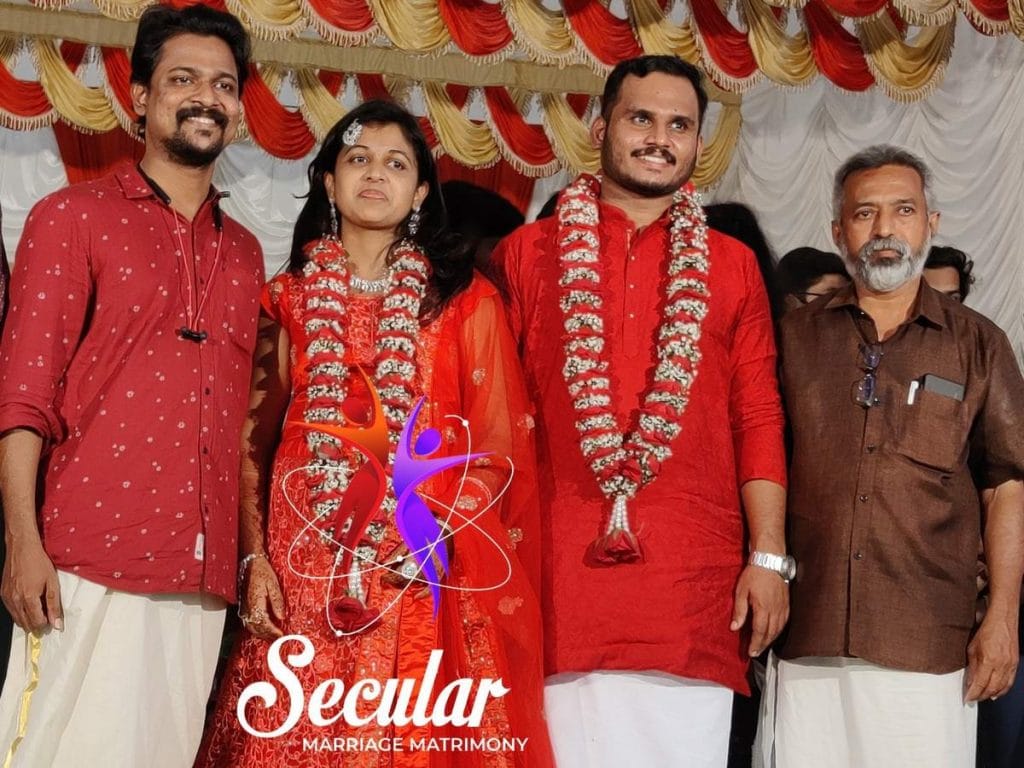
Chandran said that while mainstream platforms often feature users claiming to be “progressive” and “no caste or religion bar,” the reality rarely matches. Secular Matrimony, however, tends to attract people ready to live by these ideals.
“We don’t need just a secular or liberal person, but also a partner willing to actually make these commitments,” he added.
The platform also helped UAE-based schoolteacher Kamar Niza. A divorcee in her early 40s, she came across Secular Matrimony during the pandemic. While scrolling, she found Firoz—a man who called himself an “introvert, atheist, and proud father of two children.” “His words resonated deeply with me. I felt his loneliness mirroring my own. I reached out, just to talk. Over the next year, our conversations grew into something meaningful,” she said.
We try to monitor the platform to make it respectful. We make people fill out forms, and ask them questions first. Only those with respectful views can make contact.
–Manu Manushyajaathi, founder of Secular Matrimony
Both came from orthodox Muslim backgrounds, but had rebelled in their own ways. He was no longer a believer and she believed in God but wasn’t a practising Muslim.
“We shared our thoughts and fears about social and religious expectations from our families that we defied and cultivated a gradual understanding of each other on a deeper level,” she said.
Eventually, they married under the Special Marriage Act, bypassing personal laws. The ceremony was simple—a five-minute signing at the registrar’s office.
“There were no blessings, no celebration, no party—just a formal exchange of vows,” Niza said. At first, her family didn’t know about the marriage. When she announced it on Facebook, the backlash began.
“Despite us being financially independent, middle-aged, and in our second marriages, the idea of marrying an atheist like Firoz was still completely out of the question for my family and village. The interrogations and intense discussions that I endured during this time are some of my worst memories,” she said.
The couple have now settled in the UAE, but Niza’s relations with her family remain strained. But she has no regrets about how she met and married her partner.
“Platforms like this are helpful to all of us to an extent—they give you a space to speak up for yourself and stand for a cause,” she said resolutely.
Even as the platform provides an accepting environment, society has been slow to catch up. Even after a couple has decided to get together, problems don’t end, especially for interfaith couples.
Society vs secular love
When a US-based interfaith couple—a Muslim man and a Hindu woman—announced post-wedding celebrations in their hometown Aligarh earlier this month, they were in for a shock. Right-wing groups protested on the streets and even submitted a memorandum at the collectorate. Under pressure, the families scrapped the event.
This was in BJP-ruled Uttar Pradesh, where interfaith unions often face hostility. But even in ‘progressive’ Kerala, couples who break religious boundaries encounter resistance. And platforms like Secular Matrimony haven’t been spared their share of trouble.
Manu alleged that in 2023, an interfaith marriage facilitated through Secular Matrimony led to menacing calls from Hindutva followers in his village.
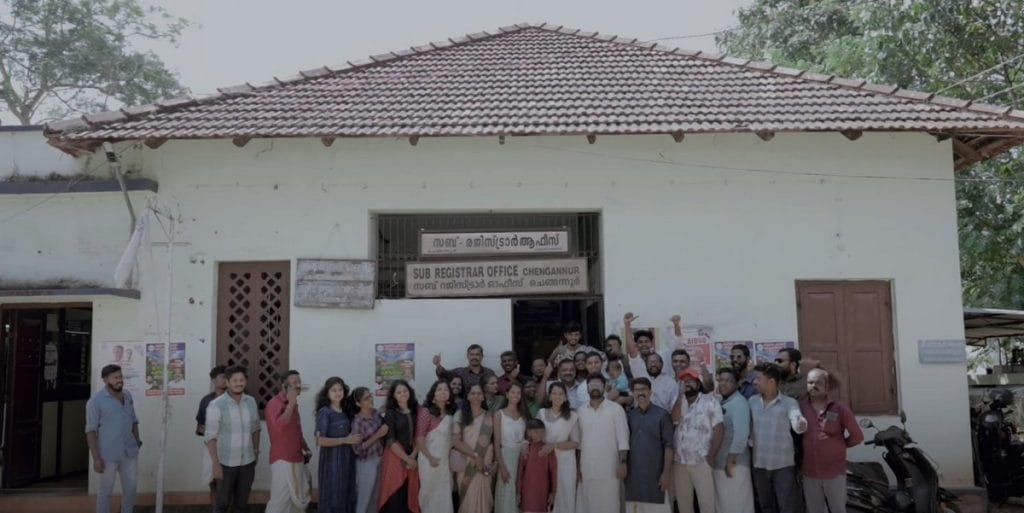
The platform has had to adapt to such challenges. After a few users reported being harassed, a rigorous screening process has been put in place to weed out bigots, misogynists, and trolls. It has to be a safe space for all.
“We try to encourage people from the LGBT community, especially transgender persons, to be part of our initiative since the idea is to create a progressive and safe matchmaking space,” Manu said. “Sometimes, on some people’s profiles or photos, there are nasty comments if a person looks a certain way. Especially in the case of transwomen. So, we also try to monitor the platform to make it respectful. We make people fill out forms, and ask them questions first. Only those with respectful views can make contact.”
But even as the platform provides an accepting environment, society has been slow to catch up. Even after a couple has decided to get together, problems don’t end. Many interfaith couples approach the platform for legal aid and assistance with the Special Marriage Act (SMA).
My own marriage was religious, but those of us who want a progressive, free society should accept this.
-Santhosh Kumar, father who made his daughter’s profile on Secular Matrimony
“We give them references of supportive lawyers, especially because the SMA requires personal address proof,” he said.
But for all the hassles that come with going the secular route, the platform’s popularity is increasing. Manu is now looking to hire a second “staff member” to help run Secular Matrimony’s various channels and pages. The platform charges a nominal fee to register profiles, although exemptions are granted if someone is unable to pay.
For Secular Matrimony, the secular Special Marriage Act isn’t a backup plan. It’s the ideal choice even for couples who are eligible to marry under personal laws.
Also Read: Live-in couples in small town India have it rough – Varanasi to Vadodara, Aligarh to Alwar
Paperwork instead of priests
Interfaith couple Alfiya and Ananthu Nilamel skipped the big fat Indian wedding for something far simpler: a quick ceremony at a magistrate’s office. In a video titled Life Above Religions, uploaded earlier this month on the Mathamillatha Jeevithangal YouTube channel, the pair beam happily as they register their marriage under the Special Marriage Act (SMA).
The couple also have an accompanying message in the video shared on the WhatsApp broadcast group of Secular Matrimony: that the middle-classes are imitating the elites by taking on burdensome expenses like haldi functions, pre-wedding photoshoots, and more.
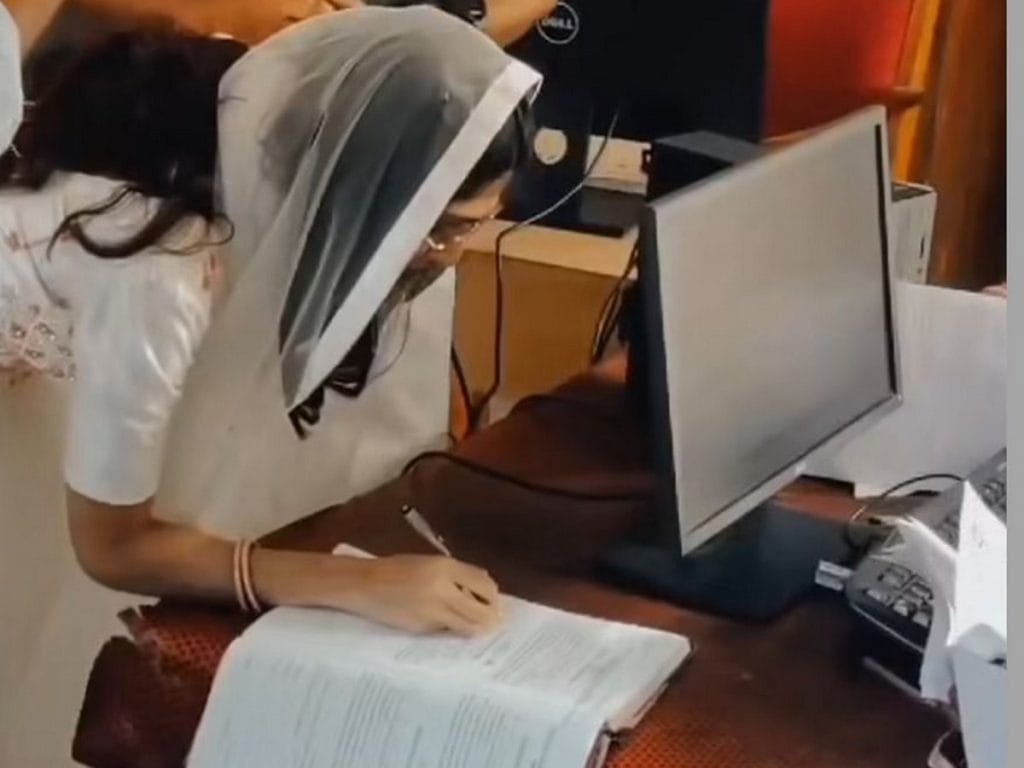
But getting married under the secular SMA isn’t easy. The law’s requirements often act as deterrents to wedlock rather than making it easier. It mandates a 30-day public notice in a “conspicuous place” to invite objections—meant to catch cases like bigamy. However, these notices, typically put up outside registrar or district magistrate offices, risk exposing interfaith and inter-caste couples to disapproving families or vigilantes.
In 2021, the Kerala government stopped uploading SMA applications on its public website after details of over 100 interfaith couples were leaked online by right-wing vigilantes. But elsewhere, SMA notices continue to open the door for scrutiny and religious vigilantism.
Conversion is technically an option for interfaith couples wanting to marry under personal laws, but it’s full of potential complications. Anti-conversion laws are enforced in 12 states—especially strictly in BJP-ruled ones like Uttar Pradesh. This leaves the SMA as the only viable option for many interfaith couples.
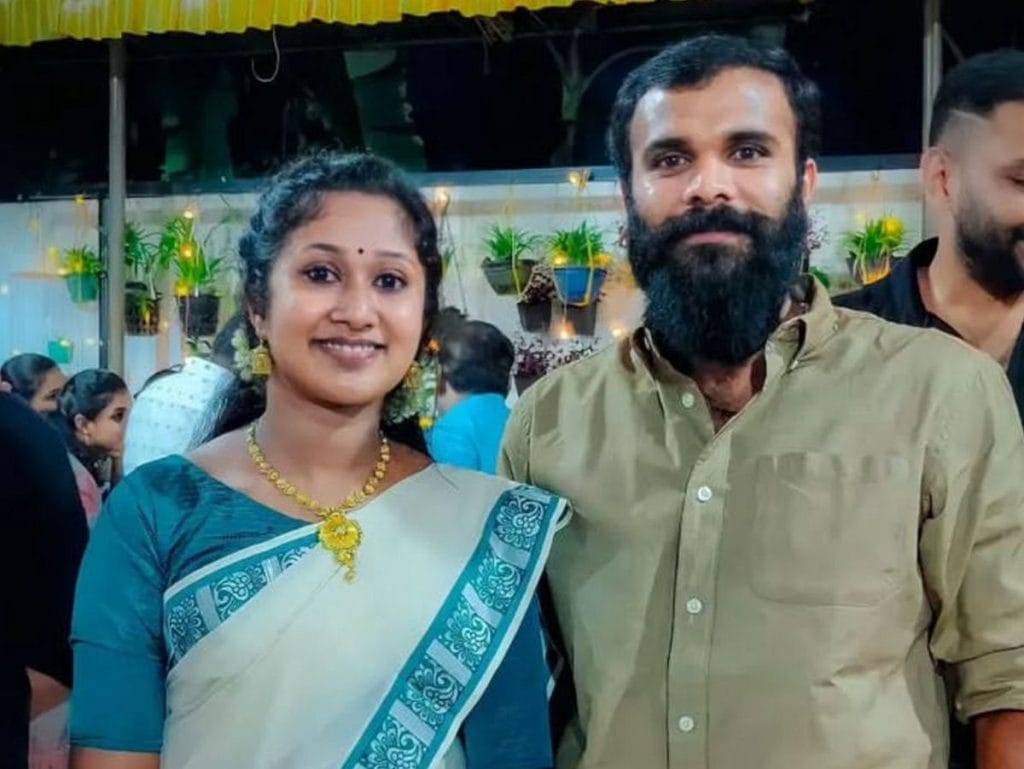
For Secular Matrimony, though, the SMA isn’t a backup plan. It’s the ideal choice even for couples who are eligible to marry under personal laws. The platform actively promotes SMA weddings, encouraging couples to skip pomp and ceremony for paperwork and equality. Their social media channels are filled with minimalist celebrations.
For instance, Sandhu and Karthika’s wedding video is as bare-bones as it gets. It shows a simply dressed couple—he in jeans and she in a kurta—answering a few questions in a government office. Officials flip through files, papers are signed, and it’s done in less than seven minutes.
Another video uploaded this August has a dash of romance. There’s pelting rain, a shared umbrella, gajras in the bride’s hair, and an exchange of garlands. Yet even here, the ceremony’s core is the government office and the notarised paper.
The Malayalam caption is attributed to Balachandran Chirammal, the bride’s father.
“In an era where religions are dangerously haunting human lives, leading a secular life is extremely difficult. I share the joy of having enabled my children to swim across this difficult sea. None of them have any religion, neither in their certificates nor in their lives,” it says. “Our daughter’s marriage under the Special Marriage Act took place on 26 July. Next is my son.”
Also Read: Girl kills father, lover turns murderer. Are rural romances growing deadlier?
‘Indian Matchmaking’ with a subversive twist
Secular Matrimony challenges caste and creed, but it shares one trait with traditional matrimonial platforms: parents. Even atheist, rationalist, and progressive parents want a say in their children’s marriages, and they’re increasingly active on the platform. It’s like ‘arranged’ matchmaking with a subversive twist.
Kochi-based banker Evin Augustine met his wife Chippy on the platform after her father, Vijayan, encouraged her to create a profile.
“My wife doesn’t subscribe to any religious beliefs or caste. I met her family, and it simply worked out; we naturally got married under the SMA. My own family are religious Christians, but they ultimately supported our decision after her father—himself an atheist and communist—advocated for us,” Augustine said.
Augustine added that he has since encouraged some of his friends and college-mates to join the platform in their search for a partner.
Lawyer Sarath Chandran had a similar story. His now-wife Keerthana’s communist father, Santhosh Kumar, created her profile.
“In Keerthana’s case, their family is totally progressive. Her sister Niranjana introduced them to the platform. That’s how her post came from her father,” Chandran said.
Keerthana’s profile, he recalled, spelled out that she was an atheist and a history professor—a neat summation of her beliefs and biodata. But Chandran insisted that compatibility goes beyond ideological markers.
“Recently, I saw a post by a man who said he didn’t care about the partner’s location or career. People will definitely write they’re atheist, but what really matters is meeting and having genuine conversations about how we want to lead our future lives. That’s what I did,” Chandran said.
Though Keerthana’s father set up her profile, it was her conversations with Chandran—about secular parenting, shared politics, and life goals—that cemented their bond.
The couple had a simple SMA marriage and are now raising a daughter, Jahanara, named after the Mughal empress.
“Keerthana, her father, and her sister are of that (progressive) mindset, while my family is not. They accepted that my family background was religious—it’s about respecting other’s beliefs, which is what matters most,” Chandran said.
For 59-year-old Santhosh Kumar, a communist and an English lecturer at a private college in Kerala, creating his daughter Keerthana’s profile felt like the “most natural thing to do”. He took the plunge after seeing her struggle to find a like-minded, secular partner. His younger daughter, who is 24, “might also use this platform”, he said.
Kumar added that many parents resist such unions because they’re “religious and narrow-minded” and fear their children will face discrimination if they marry outside caste or religion. But to him, the risk is worth it.
“I want to see more such marriages,” Kumar said. “My own marriage was religious, but those of us who want a progressive, free society should accept this.”
(Edited by Asavari Singh)



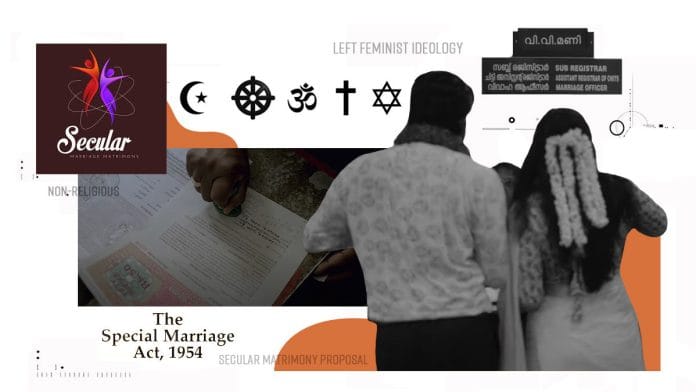



What an oxymoron!
Rationalists should not believe in love in the first place.
And someone who does believe in love is not a rationalist.
I have sent a comment earlier. It is stilll not appearing here. Why? Why do need our email id for posting a commente,?
It can be said a success only when half of the muslims registered on this platform are females secularists.
Otherwise it is matrimony jehad.
Good but won’t last long , its not practical , Wait until some of them get sued for alimony by vultures , all of this wokism will fade away real fast